Unit 2 单元综合复习课件 人教版英语七年级下册
文档属性
| 名称 | Unit 2 单元综合复习课件 人教版英语七年级下册 |  | |
| 格式 | pptx | ||
| 文件大小 | 39.8MB | ||
| 资源类型 | 试卷 | ||
| 版本资源 | 人教新目标(Go for it)版 | ||
| 科目 | 英语 | ||
| 更新时间 | 2024-03-02 17:11:38 | ||
图片预览

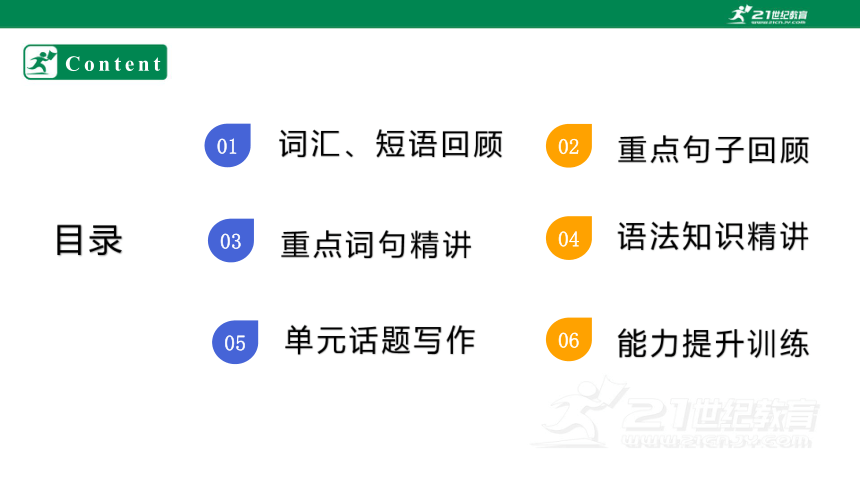

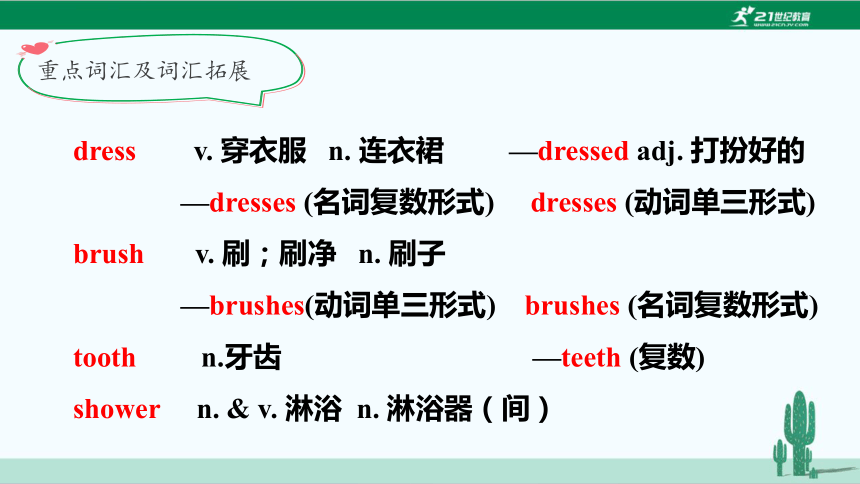
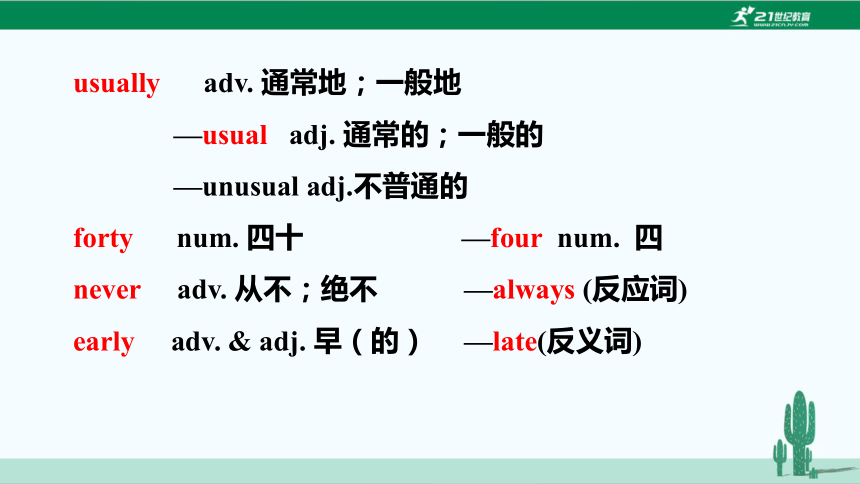

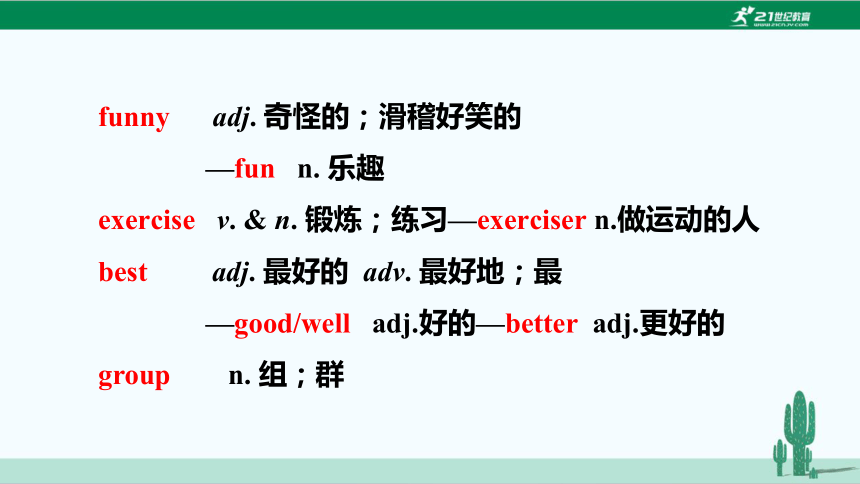
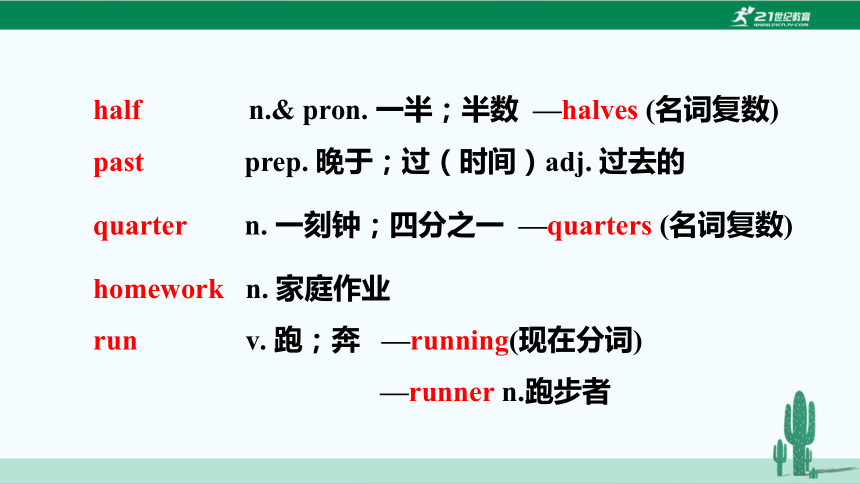
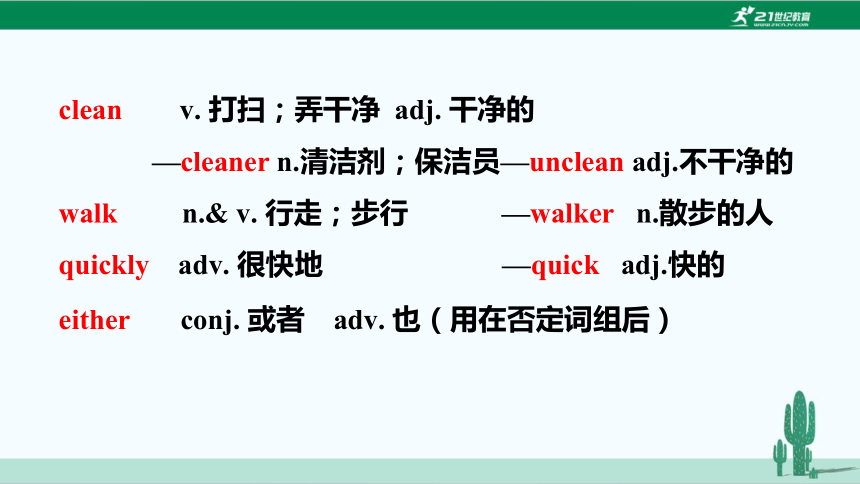
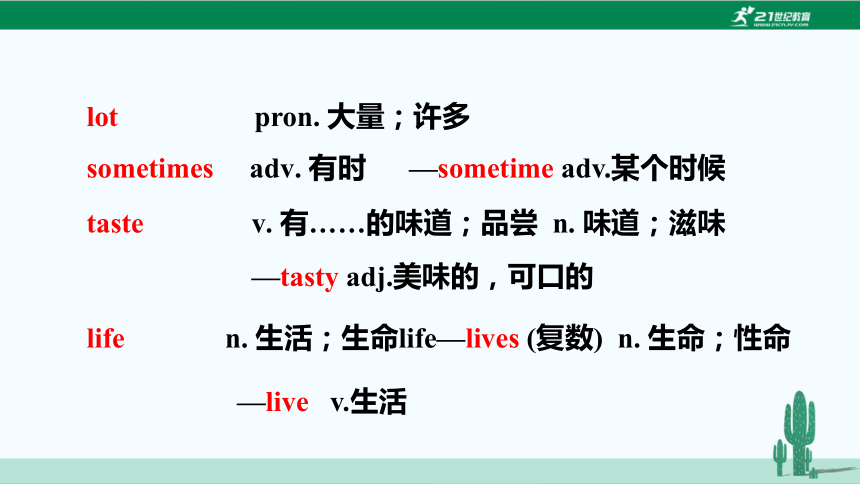
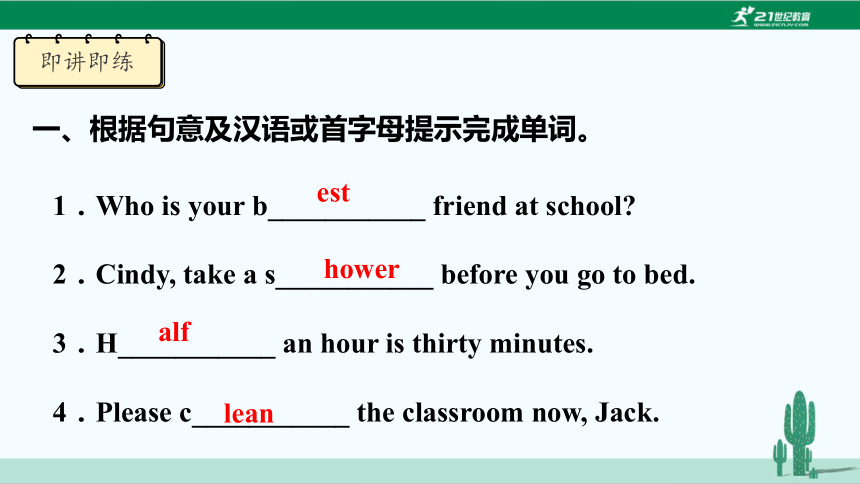
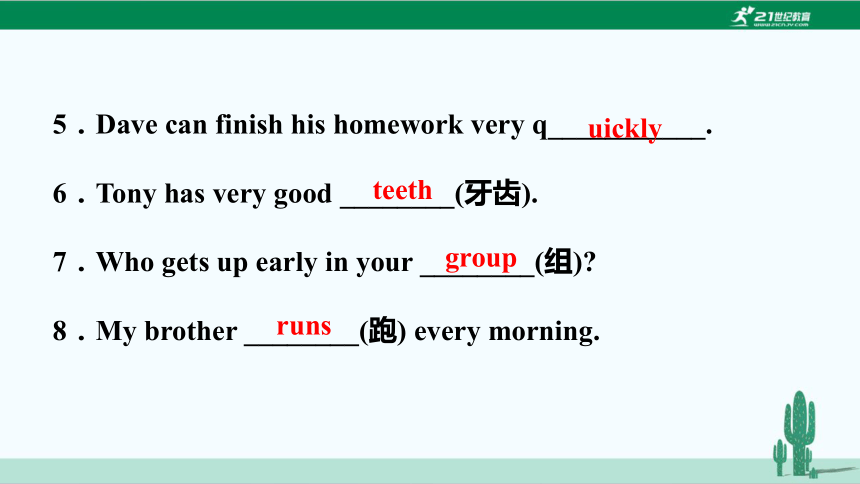
文档简介
(共68张PPT)
Unit 2 单元综合复习
人教版七年级下册
Content
词汇、短语回顾
01
重点句子回顾
02
重点词句精讲
03
语法知识精讲
04
单元话题写作
05
能力提升训练
06
目录
词汇、短语回顾
dress v. 穿衣服 n. 连衣裙 —dressed adj. 打扮好的
—dresses (名词复数形式) dresses (动词单三形式)
brush v. 刷;刷净 n. 刷子
—brushes(动词单三形式) brushes (名词复数形式)
tooth n.牙齿 —teeth (复数)
shower n. & v. 淋浴 n. 淋浴器(间)
重点词汇及词汇拓展
usually adv. 通常地;一般地
—usual adj. 通常的;一般的
—unusual adj.不普通的
forty num. 四十 —four num. 四
never adv. 从不;绝不 —always (反应词)
early adv. & adj. 早(的) —late(反义词)
fifty num. 五十 —five num. 五
job n. 工作;职业
work v. & n. 工作 —worker n.工人
station n. 电(视)台;车站
o’clock adv.(表示整点)……点钟
night n. 晚上;夜晚
funny adj. 奇怪的;滑稽好笑的
—fun n. 乐趣
exercise v. & n. 锻炼;练习—exerciser n.做运动的人
best adj. 最好的 adv. 最好地;最
—good/well adj.好的—better adj.更好的
group n. 组;群
half n.& pron. 一半;半数 —halves (名词复数)
past prep. 晚于;过(时间)adj. 过去的
quarter n. 一刻钟;四分之一 —quarters (名词复数)
homework n. 家庭作业
run v. 跑;奔 —running(现在分词)
—runner n.跑步者
clean v. 打扫;弄干净 adj. 干净的
—cleaner n.清洁剂;保洁员—unclean adj.不干净的
walk n.& v. 行走;步行 —walker n.散步的人
quickly adv. 很快地 —quick adj.快的
either conj. 或者 adv. 也(用在否定词组后)
lot pron. 大量;许多
sometimes adv. 有时 —sometime adv.某个时候
taste v. 有……的味道;品尝 n. 味道;滋味
—tasty adj.美味的,可口的
life n. 生活;生命life—lives (复数) n. 生命;性命
—live v.生活
一、根据句意及汉语或首字母提示完成单词。
即讲即练
1.Who is your b___________ friend at school
2.Cindy, take a s___________ before you go to bed.
3.H___________ an hour is thirty minutes.
4.Please c___________ the classroom now, Jack.
est
hower
alf
lean
5.Dave can finish his homework very q___________.
6.Tony has very good ________(牙齿).
7.Who gets up early in your ________(组)
8.My brother ________(跑) every morning.
uickly
teeth
group
runs
9.About a(n) ________(四分之一) of my classmates like P.E.
10.Linda’s uncle ________(工作) in our school.
11.He has a very healthy l______ .
12.My father gets up e______ in the morning. He is never late
for work.
13.What time do you b______ your teeth
quarter
works
ife
arly
rush
get up 起床;站起
get dressed 穿上衣服
go to school/work/bed 去上学/上班/上床睡觉
go home 回家
get home 到家
brush teeth 刷牙
重点短语
take a shower/walk 洗淋浴/散步;走一走
on weekends (在)周末
on school days 在上学日
radio station 广播电台
from … to … 从…到…
be late for … …迟到
half an hour 半小时
half past six in the morning 上午六点半
a quarter past three in the afternoon 下午三点一刻
do homework 做作业
clean the/ one’s room 打扫房间
either … or … 要么…要么…;或者…或者…
lots of 大量;许多
be good for … 对……有好处
eat quickly 吃得快
play sports 做运动
eat/ have breakfast 吃早餐
即讲即练
1.在周末, 我要么做家庭作业要么打扫我的房间。
______ ______ ______, I ______ do my homework ______ clean my room.
2.我女儿喜欢牛奶和鸡蛋, 因为她知道它们对她有好处。
My daughter likes milk and eggs, because she knows they ______ ______ ______ her.
一、根据汉语提示完成句子。
on the weekend
be good for
either or
3.我的体育老师经常在早上五点做运动。
My P. E. teacher often ______ ______ at five in the morning.
4.她通常在下午5: 30回到家。
She usually ______ ______ at ______ ______ ______ in the afternoon.
5.我们的英语老师起得早, 而且早晨第一节课从未迟到过。
Our English teacher ______ ______ ______, and______ ______ late for the first class in the morning.
gets up early is never
play sports
gets home half past five
重点句子回顾
1.— What time do you usually get up, Rick 里克,你通常几点起床?
— I usually get up at six thirty. 我通常6:30起床。
2.— When does Scott go to work 斯科特什么时候去上班?
— He always goes to work at eleven o'clock. 他总是11:00去上班。
3.Scott has an interesting job. 斯科特有一份有趣的工作。
4.I am never late for work. 我上班从来不迟到。
5.That's a funny time for breakfast! 那个时间吃早饭真有意思!
6.In the evening, I either watch TV or play computer games.
在晚上, 我要么么玩电脑游戏。
7.I usually exercise from six fifteen to seven. 我通常从6:15到7:00锻炼。
8.They usually eat dinner at a quarter to seven in the evening.
他们通常在晚上差一刻七点吃晚饭。
9.I don't have much time for breakfast. 我没有很多时间吃早饭。
10.After school, I sometimes play basketball for half an hour. 放学以后,我有时候打半个小时的篮球。
11.She knows it's not good for her. 她知道这对她没有好处。
12.I have a very healthy life. 我有一个非常健康的生活。
重点词句精讲
1. 介词at, in, on表时间的用法
at 用在某个时间点、某一时刻或年龄前。 at nine o'clock 在9点
at noon 在中午
at night 在夜里
at dawn在黎明
in 在世纪、年份、季节、月份、上午、下午或晚上前。 in summer 在夏季
in May 在五月份
in the evening 在傍晚
on 用在具体的某一天或某一天的上午、下午或晚上前 on Monday 在周一
on May 1st 在五月一号
on Christmas 在圣诞节那天
on the night of May 1st 五月一日当晚
2、 get dressed的用法
get dressed是get +adj的用法,意思是“穿好衣服的”。
be dressed in“穿着”,表示“穿”的状态。
eg:He can't get dressed. 他不能穿上衣服。
She is dressed in red. 她穿着红色的衣服。
get up 起床 get on 上车 get home到家 get back取回
get to到达 get off下车 get on well with...与...相处融洽 get down 记下 咽下 get away走开;逃脱 get 短语拓展
3、 eat与have表示“吃”
have作“吃”意思时,主要用于一日三餐
eat作“吃”的意思时,一般是指吃固体食物。
eg:We eat rice every day. 我们每天吃米饭。
They often eat a lot of potatoes. 他们经常吃土豆。
We often have lunch at school. 我们经常在学校吃午饭。
have意思更加广泛,可以表示“有;从事”等含义。
4、 funny与fun的区别
funny adj. 有趣的;滑稽的 指的是一种滑稽可笑的“有趣”,侧重点是让人觉得好玩或发笑 This is a very funny book. 这是一本很搞笑的书。
fun adj. 有趣的;好玩的 n. 乐趣;快乐 作形容词表示有趣好玩,而不是强调“滑稽”。 The trip is really fun. 这次旅行真有趣。
We have a lot of fun today. 我们今天玩得很高兴。
5、 时间表达法
方法 用法 例子
整点法 整点时间 整点时间+o'clock”,o'clock可省略 在7:00 at seven(o'clock)
顺度法 不是整点的所有情况 直接读出数字,先说整点后说分钟,都用基数词。表示“几点零几分”时,可在时与分之间加个O,读字母O的音。 在8:10 at eight ten
在2:40 at two forty
倒读法 不是整点的所有情况 分钟少于30分钟的,用“分钟数+past+钟点数” at five past eight 在8:05
分钟正好30分钟(半小时)的,用“thirty/half past……”表示 at thirty /half past ten在10:30
分钟超过半小时的,用“(距离下一个整点的分钟数)+to+下一个钟点数”表示 在8:40 at twenty to nine
(距离9:00差20分钟)
方法 用法 例子
用quarter表示 分钟数是15的倍数 9:15 三种表示 nine fifteen;fifteen past nine;a quarter past nine
3:45 三种表示 three forty-five;fifteen to four;a quarter to four
表示大约时间 almost 几乎 not quite 不到,差一点 just after 刚过 It's almost two. 马上到两点了。
It's not quite two. 还不到两点。
It's just after two. 刚过两点。
表明上午和下午 若想表明是上午,可在时间后加上a.m. 若想表明是下午,可在时间后加上p.m. thirteen past six a.m. 上午六点十三分。
four o'clock p.m. 下午四点。
6、 do one's homework用法
do one's homework 做某人的家庭作业
one's根据主语的情况改成相应的形容词性物主代词。注意此处的homework只能用单数形式。
do my/your/his/her/its/our/their homework。
I do my homework every day. 我每天做作业。
My sister does her homework every day .我的妹妹每天做作业。
His brother and sister do their homework every day. 他的弟妹每天做作业。
7、 either……or……用法
either……or……“要么……要么……”,“或者……或者……”,用于连接两个性质相同的词或短语,表示两者中的某一种。
eg:In the evening, I either watch TV or play computer games.在晚上,我要么看电视,要么玩电脑游戏。
You can have either this one or that one. 你拿这个或那个。
You must either go at once or wait till tomorrow. 你要么马上走,要么等到明天。
知识拓展:
either……or……连接两个成分作主语时,谓语动词通常与其靠近的主语保持一致,即“就近原则”。
Either you or I am to go. 你或我必须有人去。
Either he or you are right. 要么他对,要么你对。
8、 from…to…用法
表述时间“从……到……”。用来、地点等范围。
I usually exercise from six fifteen to seven. 我通常从6:15到7:00锻炼。
We go to school from Monday to Friday. 我们从星期一到星期五去上学。
表述地点“从……到……”。
He will travel from Beijing to Shanghai for a meeting.他将从北京到上海去开会
9、 life的用法
life的含义比较多
life泛指“生命”时是不可数名词;
泛指“性命”时是可数名词;
泛指“生活”时是不可数名词,其前不加冠词,但指某种有比较具体内容的“生活;生活方式”时则是可数名词。其复数形式为lives。
I have a very healthy life. 我的生活很健康。(指“生活方式”,可数)
Is there any life on the moon 月球上有生命吗?(指“生命”,不可数)
some time 表示“一些时间”或“一段时间” She will stay in Beijing for some fime.她将在北京待一段时间。
sometime 指将来或者过去某个不确切的时间,常用于一般将来时或一般过去时 I saw him sometime last summer.
去年夏天的某个时候我曾经见过他。
some times 意思是“几次”,time在此是可数名词,表示“倍,次” I met him some times in the street last month.上个月我在街上遇见他几次。
sometimes 意思是“有时”,表示事情发生的频率,常用于一般现在时 He sometimes writes to me.
他有时给我写信。
10.some time,sometime,some times与sometimes
11.I don't have much time for breakfast,so I usually cat very quickly.我没有很多时间吃早饭,因此我通常吃得非常快。
【详解】此句是so连接的并列句,so前后的两个句子是因果关系,so意为“因此;所以”。
★The shops were closed so I didn't get any milk.商店都关门了,所以我没买到牛奶。
3.Here are your clothes. 你的衣服在这里。
【详解】此句是here引起的倒装句,正常语序为“Your clothes are here”。当副词here,there等位于句首且主语为名词时,句子要用倒装语序。
★Here comes the bus!公共汽车来了!
★Here's your keys.你的钥匙在这里。
语法知识精讲
频率副词的用法小结
频度副词的含义:表示次数、频率的副词称为频度副词。
频度副词的位置:频度副词一般位于情态动词、助动词、连系动词之后,实义动词之前。
概述
用法
He can never understand. 他永远也不会明白。(在情态动词之后)
She is sometimes very busy. 她有时很忙。(在be动词之后)
John always comes late. 约翰总是迟到。
He often goes to school by bike. 他经常骑自行车去上学。
I usually exercise from six fifteen to seven. 我通常从6:15到7:00锻炼。
知识拓展
如何表达具体的频率、次数?
一次用once,两次用twice,三次及以上用“基数词+ times”表示。
once/twice a week 一周一次/一周两次
three/four times a year 一年三次/一年四次
如何对频率进行提问?用how often。
--How often do you write to your elder brother 你多久给你哥哥写一封信?
--Twice a week 一周两次
频率副词一般用在什么时态当中?一般现在时态当中。
He often goes to school by bike. 他经常骑自行车去上学。
what time/when引导的特殊疑问句
概述
when或what time用来询问时间
when 什么时候 可以对年、月、日以及时刻进行提问,或者询问某一动作发生的时间。既指时间点又指时间段。
what time 什么时间 提问具体的时间点,what time常对钟点进行提问。指时间点
两者可互换 问做某事的具体时间点(几点几分),两者可互换。 — What time/when does he get up every morning? 他每天早上什么时候起床?
— At seven o'clock. 七点钟。
只能用what time 问钟表所指的具体时间时,就是问单纯的时间,几点几分,与事无关。只能用what time。 — Excuse me, what time is it? 打扰一下,现在几点了?
— It's 1 o'clock. 现在是1点钟了。
只能用when 问事件发生的年份、月份、日期等,非钟点性时间,只能用when。 — When is her birthday? 她的生日什么时候?
— It's on October 19th. 10月19日
知识拓展
1.Tom is busy and he has no time to watch TV.
A. always B. seldom C. never D. sometimes
2.— Does Alan often run
— No, he just runs in the morning.
A. sometimes B. never C. seldom D. usually
一、单项选择。
即讲即练
3.— do your parents play tennis
— They usually play it on weekends.
A. What time B. Where
C. When D. What
4. Jimmy doesn‘t like carrots, so he eats them.
A. always B. often
C. usually D. never
5.— your father free at the weekend
— No. He has lots of work to do.
A. Does; always B. Is; always
C. Does; seldom D. Is; seldom
1.Mary usually________ (go) shopping with her mother on Sunday.
2. ________ (do)Peter________ (take)a shower in the evening or in the morning
3.Lisa____________ (not do) her homework in the evening.
二、用括号内所给单词的适当形式填空。
goes
Does take
doesn't do
4.She never________ (eat) hamburgers for lunch.
5.-What time Jack___________ (go) to bed
-At 10:30 p.m.
eats
does go
单元话题写作
单元话题写作
单元写作目标
此单元以 “日常作息习惯”为中心话题,让学生学会用频率副词和具体时刻表达法谈论日常生活习惯,并通过写作训练,让学生学会介绍自己的、家庭成员的或朋友的日常活动,养成良好的作息习惯和守时习惯。
素材积累
相关词汇:
1.做作业 do one’s homework 2.早睡 go to bed early
3.散步 take a walk 4.打扫房间 clean one’s room
5.在早上 in the morning 6.放学后 after school
7.半小时 half an hour 8.每天 every day
9.对……有好处 be good for 10.对……有害 be bad for
相关句型:
1.I always have a very healthy life.
2.I have a… day/weekend.
3.I always/usually/sometimes/never…
4.I either … or…
5.For breakfast/lunch/dinner, I …
6.At six thirty, I …
范例
假如你是Jack,下面图表描述了你的一天。请你用英语写一篇短文,介绍一下自己的这一天。可适当发挥,60词左右。
activities time
get up 7:00 a.m.
go to school 8:15 a.m.
have lunch 12:00 a.m.
go home 3:30 p.m.
play either tennis or basketball 4:00 p.m.
审题:
1.文体:记叙文
2.时态:一般现在时
3.人称:第一人称
4.运用平铺直叙法,从时间入手,按照时间的先后顺序,对每项活动进行介绍。
I’m Jack. I have a busy day. (引出话题)I usually get up at seven o’clock in the morning. Then I eat my breakfast. I go to school at eight fifteen. I usually have lunch at school at twelve o’clock. At half past three in the afternoon, I go home after school. Then I always play either tennis or basketball with my friends at four o’clock.(按照时间顺序介绍一天的活动安排,并用连接词进行句子间的连接和过渡) I think it’s good for my health.(评价自己安排)
能力提升训练
一、用括号内所给单词的适当形式填空。
1.Tony’s ________(tooth) are very white.
2.Bolt (博尔特) is a great ________ (run). We all like him very much.
3.Tony's sister always ________ (do) her homework first when she gets home.
4.About ten people lost their ________(life) in the accident (事故).
teeth
does
lives
runner
5.My grandpa usually ___________(exercise) from 6:00 a.m. to 7:00 a.m.
6.Yao Ming is always very busy. He eats breakfast ________ (quick) every day.
7.We have ________(lot) of homework on the weekend.
lots
exercises
quickly
二、根据括号内的要求完成下列各题,每空一词。
1.He gets home at five in the afternoon. (就划线部分提问)
_______ _______ _____________ he _________ home in the afternoon
2.Now it’s five thirty. (同义句)
Now it’s _____________ _____________ ___________.
What time does get
half past five
3.We have an English Festival in July. (对画线部分提问)
______ ________you have an English Festival
4. Mr. Green usually goes to work at seven o'clock.(改为一般疑问句)
________ Mr. Green usually________ to work at seven o'clock
5. Anna always plays volleyball after school.(改为否定句)
Anna________ plays volleyball after school.
When do
never
Does go
三、书面表达
假如你是韩梅,你的外国朋友James很想认识你的好朋友王林,请用英文写一封电子邮件,向James介绍你的好朋友王林,70词左右。
Name Age School Habits Hobbies
Wang Lin 13 No. 8 Middle School 6:00 a.m.:get up 6:15-6:45: run listen carefully in class, do homework before playing swim,
play the
violin,
read books
Dear James,
Thanks for your e-mail. I am very happy to tell you something about my best friend. __________________________________________________
Do you want to make a friend with him Looking forward to your reply.
Yours,
Han Mei
Dear James,
Thanks for your e-mail. I am very happy to tell you something about my best friend. His name is Wang Lin. He is 13 years old. Now he is in No. 8 Middle School. He has good habits. He usually gets up at 6:00 a.m. and he runs at 6:15. He often runs for half an hour. He studies hard. He listens to the teacher carefully in class and he always does his homework before playing. He is good at swimming, so he likes summer best. When he is free, he likes playing the violin and reading some books.
Do you want to make a friend with him Looking forward to your reply.
Yours,
Han Mei
谢谢
21世纪教育网(www.21cnjy.com)
中小学教育资源网站
兼职招聘:
https://www.21cnjy.com/recruitment/home/admin
Unit 2 单元综合复习
人教版七年级下册
Content
词汇、短语回顾
01
重点句子回顾
02
重点词句精讲
03
语法知识精讲
04
单元话题写作
05
能力提升训练
06
目录
词汇、短语回顾
dress v. 穿衣服 n. 连衣裙 —dressed adj. 打扮好的
—dresses (名词复数形式) dresses (动词单三形式)
brush v. 刷;刷净 n. 刷子
—brushes(动词单三形式) brushes (名词复数形式)
tooth n.牙齿 —teeth (复数)
shower n. & v. 淋浴 n. 淋浴器(间)
重点词汇及词汇拓展
usually adv. 通常地;一般地
—usual adj. 通常的;一般的
—unusual adj.不普通的
forty num. 四十 —four num. 四
never adv. 从不;绝不 —always (反应词)
early adv. & adj. 早(的) —late(反义词)
fifty num. 五十 —five num. 五
job n. 工作;职业
work v. & n. 工作 —worker n.工人
station n. 电(视)台;车站
o’clock adv.(表示整点)……点钟
night n. 晚上;夜晚
funny adj. 奇怪的;滑稽好笑的
—fun n. 乐趣
exercise v. & n. 锻炼;练习—exerciser n.做运动的人
best adj. 最好的 adv. 最好地;最
—good/well adj.好的—better adj.更好的
group n. 组;群
half n.& pron. 一半;半数 —halves (名词复数)
past prep. 晚于;过(时间)adj. 过去的
quarter n. 一刻钟;四分之一 —quarters (名词复数)
homework n. 家庭作业
run v. 跑;奔 —running(现在分词)
—runner n.跑步者
clean v. 打扫;弄干净 adj. 干净的
—cleaner n.清洁剂;保洁员—unclean adj.不干净的
walk n.& v. 行走;步行 —walker n.散步的人
quickly adv. 很快地 —quick adj.快的
either conj. 或者 adv. 也(用在否定词组后)
lot pron. 大量;许多
sometimes adv. 有时 —sometime adv.某个时候
taste v. 有……的味道;品尝 n. 味道;滋味
—tasty adj.美味的,可口的
life n. 生活;生命life—lives (复数) n. 生命;性命
—live v.生活
一、根据句意及汉语或首字母提示完成单词。
即讲即练
1.Who is your b___________ friend at school
2.Cindy, take a s___________ before you go to bed.
3.H___________ an hour is thirty minutes.
4.Please c___________ the classroom now, Jack.
est
hower
alf
lean
5.Dave can finish his homework very q___________.
6.Tony has very good ________(牙齿).
7.Who gets up early in your ________(组)
8.My brother ________(跑) every morning.
uickly
teeth
group
runs
9.About a(n) ________(四分之一) of my classmates like P.E.
10.Linda’s uncle ________(工作) in our school.
11.He has a very healthy l______ .
12.My father gets up e______ in the morning. He is never late
for work.
13.What time do you b______ your teeth
quarter
works
ife
arly
rush
get up 起床;站起
get dressed 穿上衣服
go to school/work/bed 去上学/上班/上床睡觉
go home 回家
get home 到家
brush teeth 刷牙
重点短语
take a shower/walk 洗淋浴/散步;走一走
on weekends (在)周末
on school days 在上学日
radio station 广播电台
from … to … 从…到…
be late for … …迟到
half an hour 半小时
half past six in the morning 上午六点半
a quarter past three in the afternoon 下午三点一刻
do homework 做作业
clean the/ one’s room 打扫房间
either … or … 要么…要么…;或者…或者…
lots of 大量;许多
be good for … 对……有好处
eat quickly 吃得快
play sports 做运动
eat/ have breakfast 吃早餐
即讲即练
1.在周末, 我要么做家庭作业要么打扫我的房间。
______ ______ ______, I ______ do my homework ______ clean my room.
2.我女儿喜欢牛奶和鸡蛋, 因为她知道它们对她有好处。
My daughter likes milk and eggs, because she knows they ______ ______ ______ her.
一、根据汉语提示完成句子。
on the weekend
be good for
either or
3.我的体育老师经常在早上五点做运动。
My P. E. teacher often ______ ______ at five in the morning.
4.她通常在下午5: 30回到家。
She usually ______ ______ at ______ ______ ______ in the afternoon.
5.我们的英语老师起得早, 而且早晨第一节课从未迟到过。
Our English teacher ______ ______ ______, and______ ______ late for the first class in the morning.
gets up early is never
play sports
gets home half past five
重点句子回顾
1.— What time do you usually get up, Rick 里克,你通常几点起床?
— I usually get up at six thirty. 我通常6:30起床。
2.— When does Scott go to work 斯科特什么时候去上班?
— He always goes to work at eleven o'clock. 他总是11:00去上班。
3.Scott has an interesting job. 斯科特有一份有趣的工作。
4.I am never late for work. 我上班从来不迟到。
5.That's a funny time for breakfast! 那个时间吃早饭真有意思!
6.In the evening, I either watch TV or play computer games.
在晚上, 我要么么玩电脑游戏。
7.I usually exercise from six fifteen to seven. 我通常从6:15到7:00锻炼。
8.They usually eat dinner at a quarter to seven in the evening.
他们通常在晚上差一刻七点吃晚饭。
9.I don't have much time for breakfast. 我没有很多时间吃早饭。
10.After school, I sometimes play basketball for half an hour. 放学以后,我有时候打半个小时的篮球。
11.She knows it's not good for her. 她知道这对她没有好处。
12.I have a very healthy life. 我有一个非常健康的生活。
重点词句精讲
1. 介词at, in, on表时间的用法
at 用在某个时间点、某一时刻或年龄前。 at nine o'clock 在9点
at noon 在中午
at night 在夜里
at dawn在黎明
in 在世纪、年份、季节、月份、上午、下午或晚上前。 in summer 在夏季
in May 在五月份
in the evening 在傍晚
on 用在具体的某一天或某一天的上午、下午或晚上前 on Monday 在周一
on May 1st 在五月一号
on Christmas 在圣诞节那天
on the night of May 1st 五月一日当晚
2、 get dressed的用法
get dressed是get +adj的用法,意思是“穿好衣服的”。
be dressed in“穿着”,表示“穿”的状态。
eg:He can't get dressed. 他不能穿上衣服。
She is dressed in red. 她穿着红色的衣服。
get up 起床 get on 上车 get home到家 get back取回
get to到达 get off下车 get on well with...与...相处融洽 get down 记下 咽下 get away走开;逃脱 get 短语拓展
3、 eat与have表示“吃”
have作“吃”意思时,主要用于一日三餐
eat作“吃”的意思时,一般是指吃固体食物。
eg:We eat rice every day. 我们每天吃米饭。
They often eat a lot of potatoes. 他们经常吃土豆。
We often have lunch at school. 我们经常在学校吃午饭。
have意思更加广泛,可以表示“有;从事”等含义。
4、 funny与fun的区别
funny adj. 有趣的;滑稽的 指的是一种滑稽可笑的“有趣”,侧重点是让人觉得好玩或发笑 This is a very funny book. 这是一本很搞笑的书。
fun adj. 有趣的;好玩的 n. 乐趣;快乐 作形容词表示有趣好玩,而不是强调“滑稽”。 The trip is really fun. 这次旅行真有趣。
We have a lot of fun today. 我们今天玩得很高兴。
5、 时间表达法
方法 用法 例子
整点法 整点时间 整点时间+o'clock”,o'clock可省略 在7:00 at seven(o'clock)
顺度法 不是整点的所有情况 直接读出数字,先说整点后说分钟,都用基数词。表示“几点零几分”时,可在时与分之间加个O,读字母O的音。 在8:10 at eight ten
在2:40 at two forty
倒读法 不是整点的所有情况 分钟少于30分钟的,用“分钟数+past+钟点数” at five past eight 在8:05
分钟正好30分钟(半小时)的,用“thirty/half past……”表示 at thirty /half past ten在10:30
分钟超过半小时的,用“(距离下一个整点的分钟数)+to+下一个钟点数”表示 在8:40 at twenty to nine
(距离9:00差20分钟)
方法 用法 例子
用quarter表示 分钟数是15的倍数 9:15 三种表示 nine fifteen;fifteen past nine;a quarter past nine
3:45 三种表示 three forty-five;fifteen to four;a quarter to four
表示大约时间 almost 几乎 not quite 不到,差一点 just after 刚过 It's almost two. 马上到两点了。
It's not quite two. 还不到两点。
It's just after two. 刚过两点。
表明上午和下午 若想表明是上午,可在时间后加上a.m. 若想表明是下午,可在时间后加上p.m. thirteen past six a.m. 上午六点十三分。
four o'clock p.m. 下午四点。
6、 do one's homework用法
do one's homework 做某人的家庭作业
one's根据主语的情况改成相应的形容词性物主代词。注意此处的homework只能用单数形式。
do my/your/his/her/its/our/their homework。
I do my homework every day. 我每天做作业。
My sister does her homework every day .我的妹妹每天做作业。
His brother and sister do their homework every day. 他的弟妹每天做作业。
7、 either……or……用法
either……or……“要么……要么……”,“或者……或者……”,用于连接两个性质相同的词或短语,表示两者中的某一种。
eg:In the evening, I either watch TV or play computer games.在晚上,我要么看电视,要么玩电脑游戏。
You can have either this one or that one. 你拿这个或那个。
You must either go at once or wait till tomorrow. 你要么马上走,要么等到明天。
知识拓展:
either……or……连接两个成分作主语时,谓语动词通常与其靠近的主语保持一致,即“就近原则”。
Either you or I am to go. 你或我必须有人去。
Either he or you are right. 要么他对,要么你对。
8、 from…to…用法
表述时间“从……到……”。用来、地点等范围。
I usually exercise from six fifteen to seven. 我通常从6:15到7:00锻炼。
We go to school from Monday to Friday. 我们从星期一到星期五去上学。
表述地点“从……到……”。
He will travel from Beijing to Shanghai for a meeting.他将从北京到上海去开会
9、 life的用法
life的含义比较多
life泛指“生命”时是不可数名词;
泛指“性命”时是可数名词;
泛指“生活”时是不可数名词,其前不加冠词,但指某种有比较具体内容的“生活;生活方式”时则是可数名词。其复数形式为lives。
I have a very healthy life. 我的生活很健康。(指“生活方式”,可数)
Is there any life on the moon 月球上有生命吗?(指“生命”,不可数)
some time 表示“一些时间”或“一段时间” She will stay in Beijing for some fime.她将在北京待一段时间。
sometime 指将来或者过去某个不确切的时间,常用于一般将来时或一般过去时 I saw him sometime last summer.
去年夏天的某个时候我曾经见过他。
some times 意思是“几次”,time在此是可数名词,表示“倍,次” I met him some times in the street last month.上个月我在街上遇见他几次。
sometimes 意思是“有时”,表示事情发生的频率,常用于一般现在时 He sometimes writes to me.
他有时给我写信。
10.some time,sometime,some times与sometimes
11.I don't have much time for breakfast,so I usually cat very quickly.我没有很多时间吃早饭,因此我通常吃得非常快。
【详解】此句是so连接的并列句,so前后的两个句子是因果关系,so意为“因此;所以”。
★The shops were closed so I didn't get any milk.商店都关门了,所以我没买到牛奶。
3.Here are your clothes. 你的衣服在这里。
【详解】此句是here引起的倒装句,正常语序为“Your clothes are here”。当副词here,there等位于句首且主语为名词时,句子要用倒装语序。
★Here comes the bus!公共汽车来了!
★Here's your keys.你的钥匙在这里。
语法知识精讲
频率副词的用法小结
频度副词的含义:表示次数、频率的副词称为频度副词。
频度副词的位置:频度副词一般位于情态动词、助动词、连系动词之后,实义动词之前。
概述
用法
He can never understand. 他永远也不会明白。(在情态动词之后)
She is sometimes very busy. 她有时很忙。(在be动词之后)
John always comes late. 约翰总是迟到。
He often goes to school by bike. 他经常骑自行车去上学。
I usually exercise from six fifteen to seven. 我通常从6:15到7:00锻炼。
知识拓展
如何表达具体的频率、次数?
一次用once,两次用twice,三次及以上用“基数词+ times”表示。
once/twice a week 一周一次/一周两次
three/four times a year 一年三次/一年四次
如何对频率进行提问?用how often。
--How often do you write to your elder brother 你多久给你哥哥写一封信?
--Twice a week 一周两次
频率副词一般用在什么时态当中?一般现在时态当中。
He often goes to school by bike. 他经常骑自行车去上学。
what time/when引导的特殊疑问句
概述
when或what time用来询问时间
when 什么时候 可以对年、月、日以及时刻进行提问,或者询问某一动作发生的时间。既指时间点又指时间段。
what time 什么时间 提问具体的时间点,what time常对钟点进行提问。指时间点
两者可互换 问做某事的具体时间点(几点几分),两者可互换。 — What time/when does he get up every morning? 他每天早上什么时候起床?
— At seven o'clock. 七点钟。
只能用what time 问钟表所指的具体时间时,就是问单纯的时间,几点几分,与事无关。只能用what time。 — Excuse me, what time is it? 打扰一下,现在几点了?
— It's 1 o'clock. 现在是1点钟了。
只能用when 问事件发生的年份、月份、日期等,非钟点性时间,只能用when。 — When is her birthday? 她的生日什么时候?
— It's on October 19th. 10月19日
知识拓展
1.Tom is busy and he has no time to watch TV.
A. always B. seldom C. never D. sometimes
2.— Does Alan often run
— No, he just runs in the morning.
A. sometimes B. never C. seldom D. usually
一、单项选择。
即讲即练
3.— do your parents play tennis
— They usually play it on weekends.
A. What time B. Where
C. When D. What
4. Jimmy doesn‘t like carrots, so he eats them.
A. always B. often
C. usually D. never
5.— your father free at the weekend
— No. He has lots of work to do.
A. Does; always B. Is; always
C. Does; seldom D. Is; seldom
1.Mary usually________ (go) shopping with her mother on Sunday.
2. ________ (do)Peter________ (take)a shower in the evening or in the morning
3.Lisa____________ (not do) her homework in the evening.
二、用括号内所给单词的适当形式填空。
goes
Does take
doesn't do
4.She never________ (eat) hamburgers for lunch.
5.-What time Jack___________ (go) to bed
-At 10:30 p.m.
eats
does go
单元话题写作
单元话题写作
单元写作目标
此单元以 “日常作息习惯”为中心话题,让学生学会用频率副词和具体时刻表达法谈论日常生活习惯,并通过写作训练,让学生学会介绍自己的、家庭成员的或朋友的日常活动,养成良好的作息习惯和守时习惯。
素材积累
相关词汇:
1.做作业 do one’s homework 2.早睡 go to bed early
3.散步 take a walk 4.打扫房间 clean one’s room
5.在早上 in the morning 6.放学后 after school
7.半小时 half an hour 8.每天 every day
9.对……有好处 be good for 10.对……有害 be bad for
相关句型:
1.I always have a very healthy life.
2.I have a… day/weekend.
3.I always/usually/sometimes/never…
4.I either … or…
5.For breakfast/lunch/dinner, I …
6.At six thirty, I …
范例
假如你是Jack,下面图表描述了你的一天。请你用英语写一篇短文,介绍一下自己的这一天。可适当发挥,60词左右。
activities time
get up 7:00 a.m.
go to school 8:15 a.m.
have lunch 12:00 a.m.
go home 3:30 p.m.
play either tennis or basketball 4:00 p.m.
审题:
1.文体:记叙文
2.时态:一般现在时
3.人称:第一人称
4.运用平铺直叙法,从时间入手,按照时间的先后顺序,对每项活动进行介绍。
I’m Jack. I have a busy day. (引出话题)I usually get up at seven o’clock in the morning. Then I eat my breakfast. I go to school at eight fifteen. I usually have lunch at school at twelve o’clock. At half past three in the afternoon, I go home after school. Then I always play either tennis or basketball with my friends at four o’clock.(按照时间顺序介绍一天的活动安排,并用连接词进行句子间的连接和过渡) I think it’s good for my health.(评价自己安排)
能力提升训练
一、用括号内所给单词的适当形式填空。
1.Tony’s ________(tooth) are very white.
2.Bolt (博尔特) is a great ________ (run). We all like him very much.
3.Tony's sister always ________ (do) her homework first when she gets home.
4.About ten people lost their ________(life) in the accident (事故).
teeth
does
lives
runner
5.My grandpa usually ___________(exercise) from 6:00 a.m. to 7:00 a.m.
6.Yao Ming is always very busy. He eats breakfast ________ (quick) every day.
7.We have ________(lot) of homework on the weekend.
lots
exercises
quickly
二、根据括号内的要求完成下列各题,每空一词。
1.He gets home at five in the afternoon. (就划线部分提问)
_______ _______ _____________ he _________ home in the afternoon
2.Now it’s five thirty. (同义句)
Now it’s _____________ _____________ ___________.
What time does get
half past five
3.We have an English Festival in July. (对画线部分提问)
______ ________you have an English Festival
4. Mr. Green usually goes to work at seven o'clock.(改为一般疑问句)
________ Mr. Green usually________ to work at seven o'clock
5. Anna always plays volleyball after school.(改为否定句)
Anna________ plays volleyball after school.
When do
never
Does go
三、书面表达
假如你是韩梅,你的外国朋友James很想认识你的好朋友王林,请用英文写一封电子邮件,向James介绍你的好朋友王林,70词左右。
Name Age School Habits Hobbies
Wang Lin 13 No. 8 Middle School 6:00 a.m.:get up 6:15-6:45: run listen carefully in class, do homework before playing swim,
play the
violin,
read books
Dear James,
Thanks for your e-mail. I am very happy to tell you something about my best friend. __________________________________________________
Do you want to make a friend with him Looking forward to your reply.
Yours,
Han Mei
Dear James,
Thanks for your e-mail. I am very happy to tell you something about my best friend. His name is Wang Lin. He is 13 years old. Now he is in No. 8 Middle School. He has good habits. He usually gets up at 6:00 a.m. and he runs at 6:15. He often runs for half an hour. He studies hard. He listens to the teacher carefully in class and he always does his homework before playing. He is good at swimming, so he likes summer best. When he is free, he likes playing the violin and reading some books.
Do you want to make a friend with him Looking forward to your reply.
Yours,
Han Mei
谢谢
21世纪教育网(www.21cnjy.com)
中小学教育资源网站
兼职招聘:
https://www.21cnjy.com/recruitment/home/admin
同课章节目录
- Unit 1 Can you play the guitar?
- Section A
- Section B
- Unit 2 What time do you go to school?
- Section A
- Section B
- Unit 3 How do you get to school?
- Section A
- Section B
- Unit 4 Don't eat in class.
- Section A
- Section B
- Unit 5 Why do you like pandas?
- Section A
- Section B
- Unit 6 I'm watching TV.
- Section A
- Section B
- Review of Units 1-6
- Unit 7 It's raining!
- Section A
- Section B
- Unit 8 Is there a post office near here?
- Section A
- Section B
- Unit 9 What does he look like?
- Section A
- Section B
- Unit 10 I'd like some noodles.
- Section A
- Section B
- Unit 11 How was your school trip?
- Section A
- Section B
- Unit 12 What did you do last weekend?
- Section A
- Section B
